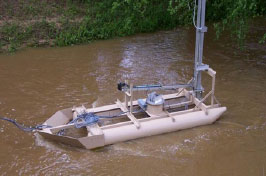Sediment Transport
 Sediments are a global-scale pollutant whose yield has been estimated at 20 billion tons per year. Water quality is impacted by the presence of suspended sediment and is further reduced when anthropogenic pollutants, bacteria, or heavy metals are present. The results of corrective actions on fluvial systems, assessment of soil erosion losses, and reservoir sedimentation can be determined using suspended and bedload sediment data.
Sediments are a global-scale pollutant whose yield has been estimated at 20 billion tons per year. Water quality is impacted by the presence of suspended sediment and is further reduced when anthropogenic pollutants, bacteria, or heavy metals are present. The results of corrective actions on fluvial systems, assessment of soil erosion losses, and reservoir sedimentation can be determined using suspended and bedload sediment data.
Accurate measurements of sediment flux are difficult to obtain since sediment load is highly variable in both time and space. In many streams, the majority of sediment moves during flood events caused by a few large storms per year making the collection of physical sediment samples difficult and sometimes dangerous. Bedload sediment transport measurements, suffer from some of the same difficulties as suspended sediment monitoring, namely poor spatial and temporal resolution and safety to personnel.
The goal of this research is to develop acoustic hardware and measurement techniques for non-experts to improve the monitoring of suspended and bedload sediment transport.